Faculty of Agriculture, Udayana University, Gadjah Mada University, Syiah Kuala University, and Andalas University with the Support of Belgiums Ghent University Empowering Youth Farmers Alfagro
It is undeniable that most of the younger generation are reluctant to work as farmers so that the number of farmers is decreasing over time. Various obstacles and backgrounds are classic reasons for avoiding the farming profession. Among them are the uncertainty of prices and markets for cultivated commodities, limited capital and access to technology and the most basic is that farmers are seen as professions that are not bona fide. Although a number of “farmers” have actually had success with high economic returns, some of them have even shared their experiences and knowledge through social media and exhibitions. However, this socialization does not seem to have touched the conscience of most of the younger generation so that work as a farmer remains the last option for the younger generation.
Like the Government, the Faculty of Agriculture as a formal educational institution views this as one of the main problems for the sustainability of the function of the agricultural sector. In order to embrace the younger generation to take part in the agricultural sector, the Faculty of Agriculture, Udayana University (UNUD) together with Gadjah Mada University (UGM), Syiah Kuala University (USK), and Andalas University (Unand) with the support of Ghent University (Ughent) from Belgium united steps to empower prospective young farmers in Bali, by targeting prospective millennial farmers in Banjar Selentang, Petang Village, Petang District, Badung Regency. This step was revealed in a Workshop held by the Faculty of Agriculture, Udayana University on Friday-Saturday, August 26-27 2022. The workshop with the theme “BambIndo Program Empowering Young Alfagro Farmers to Become Agricultural Entrepreneur Candidates” was held as part of the birthday celebration 55th and the 44th Family Board of the Faculty of Agriculture, Udayana University which falls on September 1, 2022. In his remarks and opening of the workshop, the Dean of the Faculty of Agriculture stated that this workshop is one of the implementations of the role of the Faculty of Agriculture of Udayana University as an agent of change not only in the environment. campus but also outside the campus, especially among the community. It was also mentioned that the recruitment of young Alfagro farmers and the implementation of workshops were an important part of the BamBIndo Program (Bamboo for biochar: an opportunity for scientific, societal and environmental change in Indonesia). BamBIndo is the theme of collaborative research between UNUD, UGM, USK, Unand, and Ughent which has taken place from 2019 to 2022. According to the head of the UNUD Research Team (BambIndo Co-promoter UNUD), Dr. Ir. Anak Agung Istri Kesumadewi, M.Si, this study raised the potential of bamboo biochar as a soil enhancer. Biochar is very potential to be used because it is easy to make from various types of waste and biochar only needs to be added to the soil every few years so that it is considered ecologically, economically and socially beneficial.
In carrying out biochar research in the field which took place in Plaga Village, Petang District, Badung Regency in 2021-2022, the UNUD biochar team provided an opportunity for a group of farmers and students of SMKN 1 Petang to be personally involved in researching the application of several types of biochar in corn and maize cultivation. edamame. Students of SMKN 1 Petang are also given the responsibility of taking N2O gas samples and soil samples to illustrate that agricultural cultivation, especially the use of N fertilizers, will contribute to greenhouse gases under certain conditions. With this understanding, the knowledge of plant cultivation that has been learned from the learning process at SMKN is complemented by the need for cultivation technology that is more environmentally friendly without leaving the potential for production and economic income. This concept turned out to have been well adopted by the SMKN 1 Evening students who then gathered themselves into the Alfagro Farmer Youth group which was initiated and chaired by I Putu Angga Saputra and consisted of 15 students and alumni of SMKN 1 Evening. Five of these alumni are currently studying at UNUD, namely 4 people at the Faculty of Agriculture and 1 person at the Faculty of Animal Husbandry. Alfagro Young Farmers with BambIndo funding then cultivate vegetable commodities using bamboo biochar, wood biochar, rice husk biochar, and coffee husk biochar intercropping on agricultural land borrowed from Mr. Darsana, SP covering an area of ??20 acres with the main commodity of California lemon. The results of Alfagro's Young Farmer cultivation activities are then evaluated in a workshop on 26-27 August 2022.
The theme of the workshop on the first day was Evaluation of Biochar Applications in Vegetable Cultivation for Young Alfagro Farmers. The workshop was guided by Prof. Dr. Ir. Darusman, M.Sc from USK, with evaluator Dr. Ir. Benito Heru Purwanto, MS., M.Agr from UGM. Two representatives of Alfagro Farmer Youth and a student representative who conducted research on Alfagro's land, were given the opportunity to present their own research experiences that had been carried out independently. The three publications were Ni Luh Utami with a presentation entitled The effect of biochar on soil properties, I Putu Angga Saputra who introduced Alfagro and then presented the effect of biochar on the growth and yield of vegetable crops, and I Komang Arsana who presented a strategy for making bamboo biochar, husks, coffee husks, and wood. The presentations made by the three marketers show that the BambIndo program has succeeded in introducing the technology for the manufacture and use of biochar in vegetable cultivation. Alfagro Farmer Youth is skilled in making and applying biochar when cultivating several types of vegetable crops. This cultivation activity is also accompanied by research on agricultural soil quality which shows that biochar improves soil properties. The results of these cultivation activities indicate that the vegetable commodity that reaches its agronomic potential with minimal pest constraints is pakcoy. Plants that produce quite well are cabbage and broccoli but need to be treated by Crosi caterpillars (Crocidolomia binotalis Zeller) and clubroot. Mustard greens are the plants most susceptible to clubroot. Other crops that are very potential to be cultivated are carrots, California lemons, and purple eggplants. The general conclusion obtained from the results of vegetable cultivation activities using biochar is that biochar improves the quality of agricultural soil and increases the yield of pakcoy, cabbage, broccoli, and mustard greens. The results of the soil analysis showed that the soil cultivated by Alfagro farmer youths was classified as fertile but the productivity was not maximized. These results were then followed up on the second day of the workshop.
The theme of the workshop on the second day was “Agribusiness Planning for Young Alfagro Farmers” with Prof. moderator. Dr. Ir. Hervianti, MS from Unand and the evaluator is Dr. Ir. Benito Heru Purwanto, MS, M.Agr. The UNUD BambIndo team together with co-promoters UGM, USK, and Unand provided reviews, suggestions and input based on information and data from the presentation of students and youths of Tani Alfagro on the first day. Appearing as a speaker was Ni Wayan Sri Sutari, Sp.MP. with the title of Business Development presentation, Dr. Ir. I Wayan Diara, MS with the presentation title being Management of Soil Fertility for Vegetable Cultivation, and Ir. I Gusti Alit Gunadi, MS. with the title of Presentation on Vegetable Crop Cultivation Technology.
Agricultural land used for cultivation by young Alfagro farmers is classified as fertile with constraints on water availability in May-July and pest attacks, especially Crosi caterpillars and clubroot. Thus, the productivity of the soil is not optimal. Suggestions and inputs are then directed to improve the agricultural land management system to increase soil productivity. The focus is then prioritized on improving cultivation technology and managing soil fertility by bringing together soil fertility conditions at the Alfagro location with the nutritional, water and climate needs of the cultivated plants. Pemrasaran explained the general need for fertilizers in terms of type, amount, and time and how to apply them for several vegetable commodities that will be cultivated by Alfagro Youth Farmers. The need for a strategy to use biochar and the use of liquid smoke as a by-product of biochar is also suggested to overcome pest attacks. However, it must be ensured that the raw material for biochar to be used is organic waste. In order to ensure economic benefits from cultivated commodities, it is recommended to develop vegetable-based farming by reaching the potential of traditional markets and supermarkets by utilizing social media and other marketing platforms. The general conclusion obtained on the second day is that Alfagro's Youth Farmer has the potential to be developed by improving soil productivity through soil fertility approaches and cultivation technology. Marketing can be done by utilizing social media in addition to traditional markets and supermarkets. In an effort to continue the work of young Alfagro farmers, especially to develop their entrepreneurial activities, support from various parties is needed, both in funding assistance, introduction of technology and innovation, as well as assistance to ensure the quality, quantity, and continuity of production in accordance with market needs.
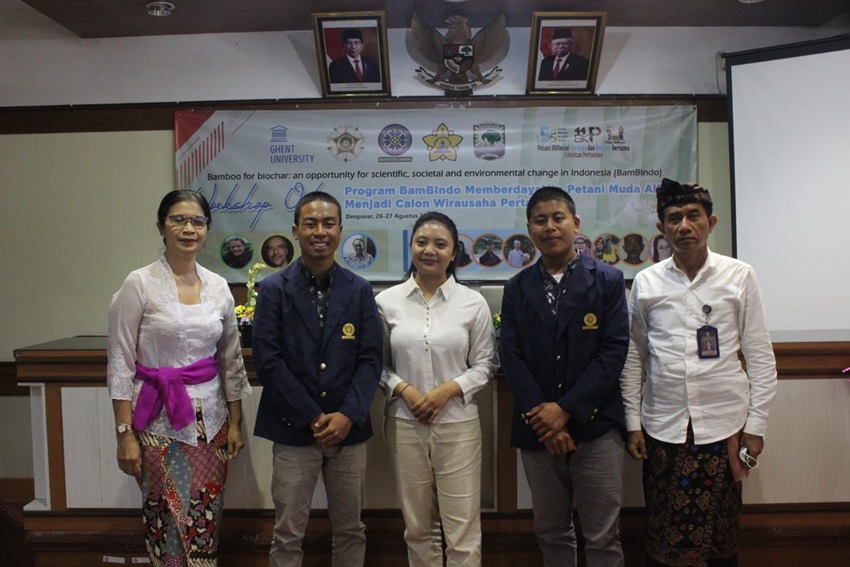
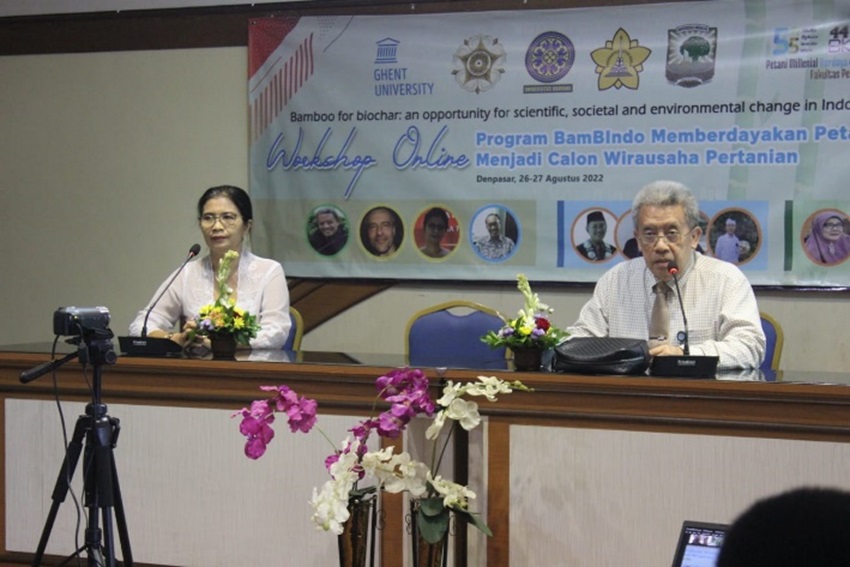
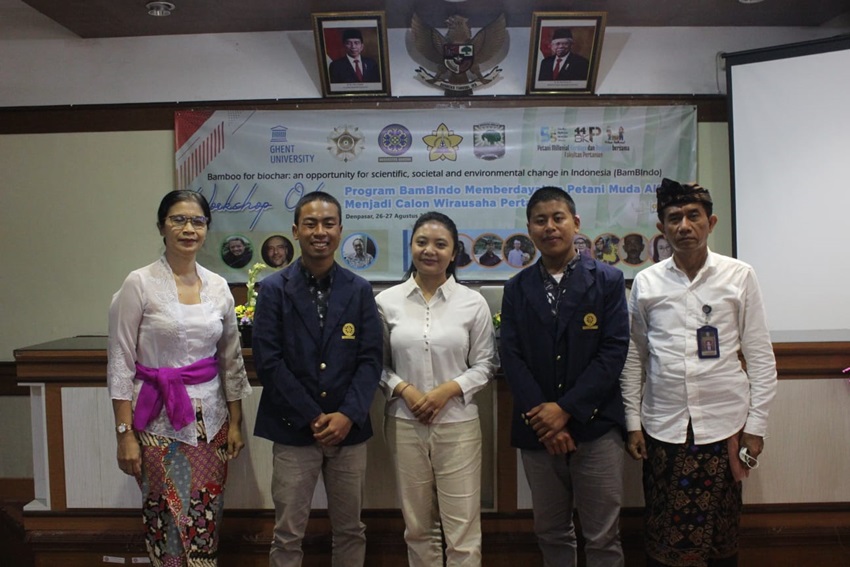
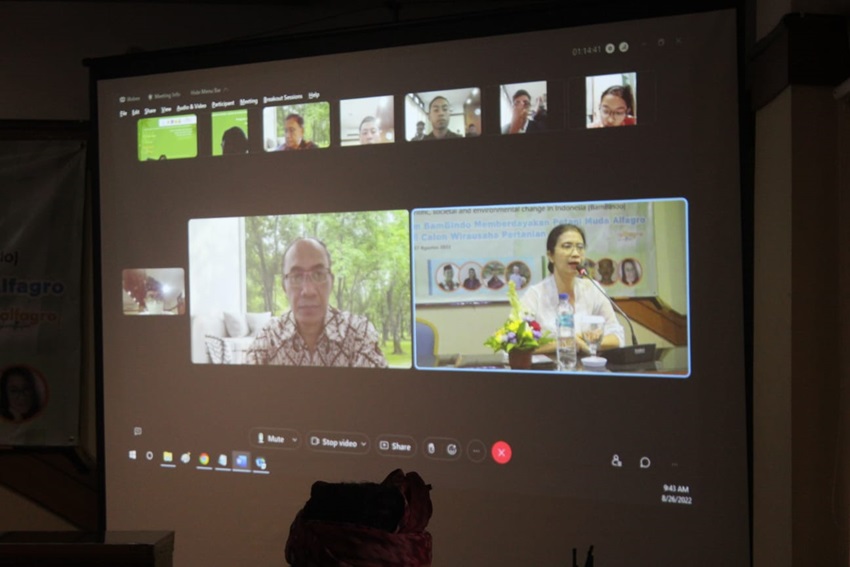
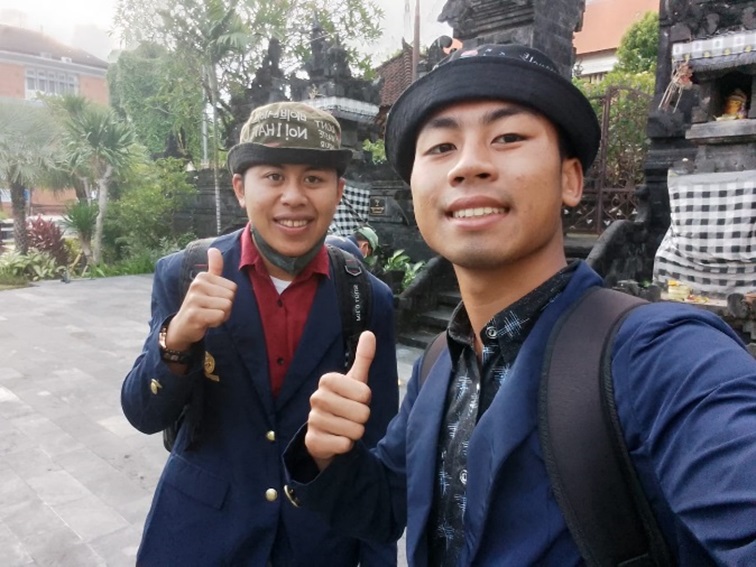
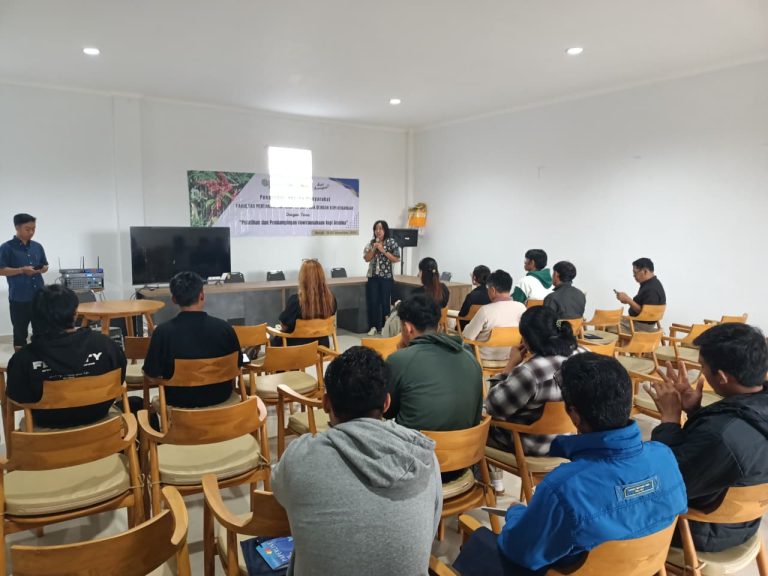
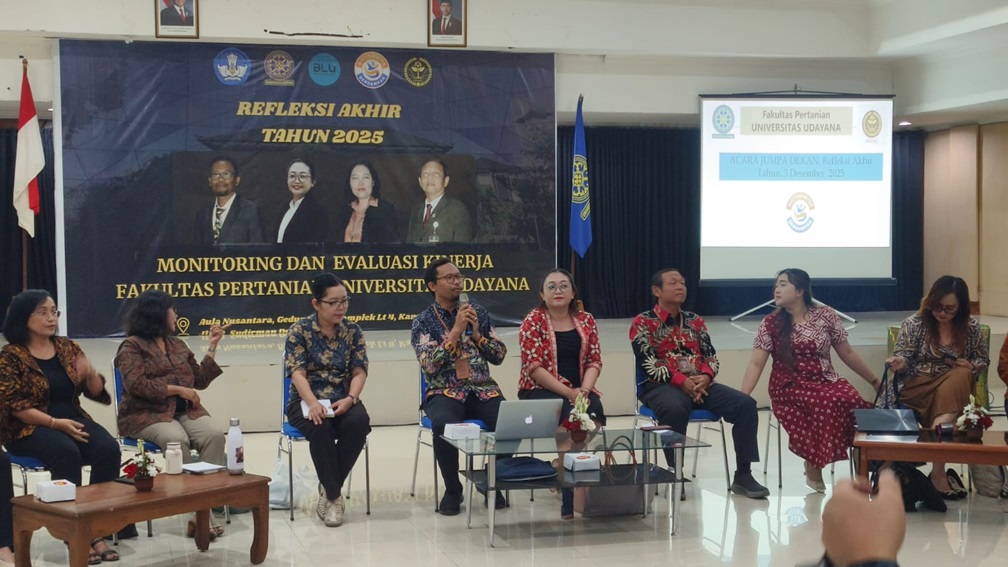
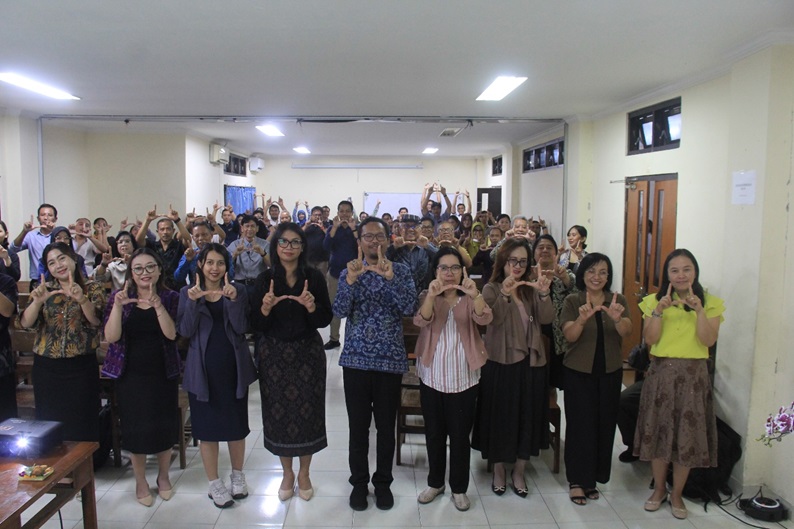
UDAYANA UNIVERSITY